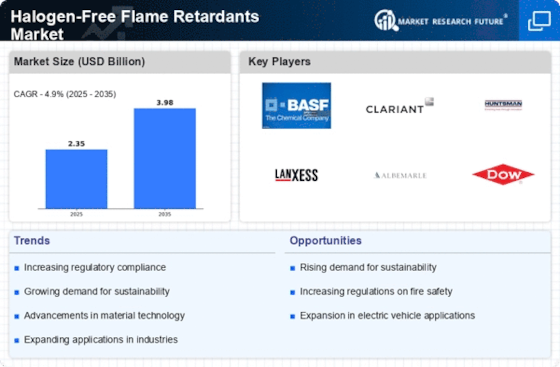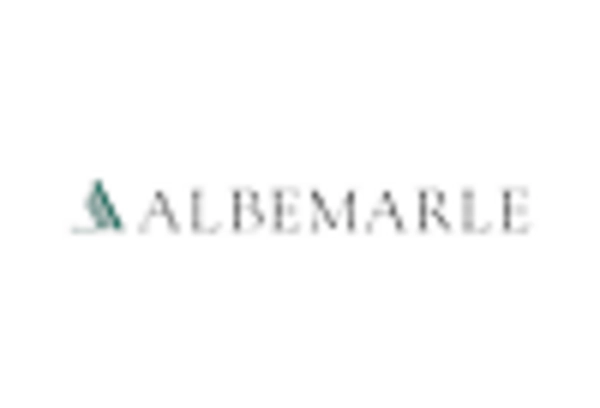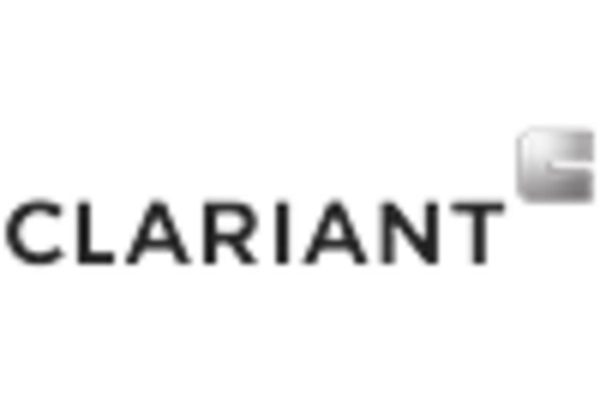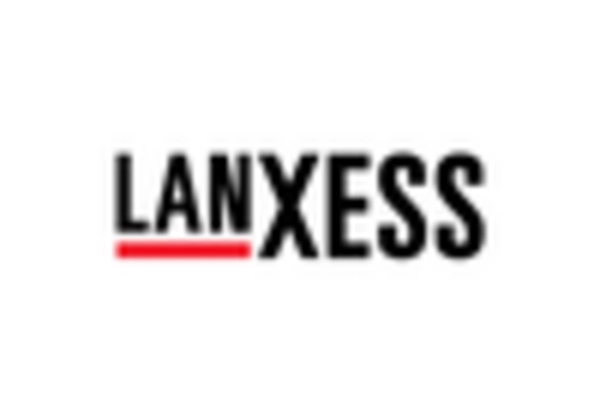-
Executive Summary
-
Market Introduction
-
Definition 19
-
Scope Of The Study 19
-
List Of Assumptions 20
-
Market Structure 20
-
Research Methodology
-
Research Process 22
-
Primary Research 23
-
Secondary Research 24
-
Market Size Estimation 24
-
Forecast Model 25
-
Market Dynamics
-
Introduction 27
-
Drivers 28
- Stringent Regulations Against The Use Of Halogenated Flame Retardants 28
- Increasing Demand In The Building And Construction Industry 28
- Growing Demand In The Electrical And Electronics Industry 29
-
Restraints 30
- High Loading Levels Of Halogen-Free Flame Retardants 30
-
Trends 30
- Growing Use Of Plastic In The Transportation Industry 30
-
Market Factor Analysis
-
Supply Chain Analysis 33
- Raw Material Suppliers 33
- Halogen-Free Flame Retardant Producers 33
- Distribution Channel 34
- End Users 34
-
Porter’s Five Forces Analysis 34
- Threat Of New Entrants 35
- Threat Of Rivalry 35
- Threat Of Substitutes 35
- Bargaining Power Of Suppliers 35
- Bargaining Power Of Buyers 35
-
Global Halogen-Free Flame Retardants Market, By Type
-
Introduction 37
-
Aluminum Trihydrate 39
-
Phosphorous Based 40
-
Magnesium Hydroxide 41
-
Others 42
-
Global Halogen-Free Flame Retardants Market, By Resin
-
Introduction 44
-
Polyethylene 46
-
Polypropylene 47
-
Epoxy 48
-
Unsaturated Polyesters 49
-
Polyvinyl Chloride 50
-
Styrenics 51
-
Engineered Thermoplastics 52
-
Rubber 53
-
Others 54
-
Global Halogen-Free Flame Retardants Market, By End-Use Industry
-
Introduction 57
-
Building & Construction 58
-
Electrical & Electronics 60
-
Transportation 61
-
Consumer Goods 62
-
Others 63
-
Global Halogen-Free Flame Retardants Market, By Region
-
Introduction 65
-
North America 70
- US 74
- Canada 77
-
Europe 80
- Germany 84
- Russia 87
- Italy 90
- France 93
- Spain 96
- UK 99
- Poland 102
- Belgium 105
- The Netherlands 108
- Rest Of Europe 111
-
Asia-Pacific 114
- China 118
- Japan 121
- India 124
- South Korea 127
- Thailand 130
- Malaysia 133
- Australia & New Zealand 136
- Rest Of Asia-Pacific 139
-
Latin America 142
- Brazil 146
- Mexico 149
- Argentina 152
- Rest Of Latin America 155
-
Middle East & Africa 158
- Turkey 162
- Saudi Arabia 165
- Israel 168
- UAE 171
- Egypt 174
- Rest Of Middle East & Africa 177
-
Competitive Landscape
-
Introduction 182
- Market Strategy Analysis 182
-
Key Developments Analysis 183
-
Company Profiles
-
Clariant AG 186
- Company Overview 186
- Financial Overview 186
- Products Offered 187
- Key Developments 187
- SWOT Analysis 187
- Key Strategies 187
-
LANXESS 188
- Company Overview 188
- Financial Overview 188
- Products Offered 189
- Key Developments 189
- SWOT Analysis 190
- Key Strategies 190
-
J. M. Huber Corporation 191
- Company Overview 191
- Financial Overview 191
- Products Offered 191
- SWOT Analysis 192
- Key Strategy 192
-
Israel Chemicals Limited 193
- Company Overview 193
- Financial Overview 193
- Products Offered 194
- SWOT Analysis 195
- Key Strategies 195
-
Nabaltech AG 196
- Company Overview 196
- Financial Overview 196
- Key Developments 197
- SWOT Analysis 198
- Key Strategies 198
-
BASF SE 199
- Company Overview 199
- Financial Overview 199
- SWOT Analysis 200
- Key Strategies 200
-
RTP Company 201
- Company Overview 201
- Financial Overview 201
- Products Offered 201
- SWOT Analysis 202
- Key Strategy 202
-
Celanese Corp 203
- Company Overview 203
- Financial Overview 203
- Products Offered 204
- SWOT Analysis 205
- Key Strategy 205
-
Greenchemicals SpA 206
- Company Overview 206
- Financial Overview 206
- SWOT Analysis 207
- Key Strategy 207
-
Kisuma Chemicals B.V. 208
- Company Overview 208
- Financial Overview 208
- Products Offered 208
- Key Developments 208
- SWOT Analysis 209
- Key Strategy 209
-
Amfine Chemical Corporation 210
- Company Overview 210
- Financial Overview 210
- SWOT Analysis 210
- Key Strategy 210
-
Conclusion
-
List Of Tables
-
LIST OF ASSUMPTIONS 20
-
GLOBAL HALOGEN-FREE FLAME RETARDANTS MARKET, BY TYPE, 2023-2032(USD MILLION) 37
-
GLOBAL HALOGEN-FREE FLAME RETARDANTS MARKET, BY TYPE, 2023-2032(THOUSAND TONS) 38
-
GLOBAL HALOGEN-FREE FLAME RETARDANTS MARKET, BY TYPE, 2023-2032(THOUSAND TONS) 38
-
GLOBAL ALUMINUM TRIHYDRATE BASED HALOGEN-FREE FLAME RETARDANTS MARKET, 2023-2032(USD MILLION) 39
-
GLOBAL ALUMINUM TRIHYDRATE HALOGEN-FREE FLAME RETARDANTS MARKET, 2023-2032(THOUSAND TONS) 39
-
GLOBAL PHOSPHORUS BASED HALOGEN-FREE FLAME RETARDANTS MARKET, 2023-2032(USD MILLION) 40
-
GLOBAL PHOSPHORUS BASED HALOGEN-FREE FLAME RETARDANTS MARKET, 2023-2032(THOUSAND TONS) 40
-
GLOBAL MAGNESIUM HYDROXIDE BASED HALOGEN-FREE FLAME RETARDANTS MARKET, 2023-2032(USD MILLION) 41
-
GLOBAL MAGNESIUM HYDROXIDE HALOGEN-FREE FLAME RETARDANTS MARKET, 2023-2032(THOUSAND TONS) 41
-
GLOBAL OTHER HALOGEN-FREE FLAME RETARDANTS MARKET, 2023-2032(USD MILLION) 42
-
GLOBAL OTHER HALOGEN-FREE FLAME RETARDANTS MARKET, 2023-2032(THOUSAND TONS) 42
-
GLOBAL HALOGEN-FREE FLAME RETARDANTS MARKET, BY RESIN, 2023-2032(USD MILLION) 45
-
GLOBAL HALOGEN-FREE FLAME RETARDANTS MARKET, BY RESIN, 2023-2032(THOUSAND TONS) 46
-
GLOBAL HALOGEN-FREE FLAME RETARDANTS MARKET, FOR POLYETHYLENE, 2023-2032(USD MILLION) 46
-
GLOBAL HALOGEN-FREE FLAME RETARDANTS MARKET, FOR POLYETHYLENE, 2023-2032(THOUSAND TONS) 47
-
GLOBAL HALOGEN-FREE FLAME RETARDANTS MARKET, FOR POLYPROPYLENE, 2023-2032(USD MILLION) 47
-
GLOBAL HALOGEN-FREE FLAME RETARDANTS MARKET, FOR POLYPROPYLENE, 2023-2032(THOUSAND TONS) 48
-
GLOBAL HALOGEN-FREE FLAME RETARDANTS MARKET, FOR EPOXY, 2023-2032(USD MILLION) 48
-
GLOBAL HALOGEN-FREE FLAME RETARDANTS MARKET, FOR EPOXY, 2023-2032(THOUSAND TONS) 49
-
GLOBAL HALOGEN-FREE FLAME RETARDANTS MARKET, FOR UNSATURATED POLYESTER, 2023-2032(USD MILLION) 49
-
GLOBAL HALOGEN-FREE FLAME RETARDANTS MARKET, FOR UNSATURATED POLYESTER, 2023-2032(THOUSAND TONS) 50
-
GLOBAL HALOGEN-FREE FLAME RETARDANTS MARKET, FOR POLYVINYL CHLORIDE, 2023-2032(USD MILLION) 50
-
GLOBAL HALOGEN-FREE FLAME RETARDANTS MARKET, FOR POLYVINYL CHLORIDE, 2023-2032(THOUSAND TONS) 51
-
GLOBAL HALOGEN-FREE FLAME RETARDANTS MARKET, FOR STYRENICS, 2023-2032(USD MILLION) 51
-
GLOBAL HALOGEN-FREE FLAME RETARDANTS MARKET, FOR STYRENICS, 2023-2032(THOUSAND TONS) 52
-
GLOBAL HALOGEN-FREE FLAME RETARDANTS MARKET, FOR ENGINEERED THERMOPLASTICS, 2023-2032(USD MILLION) 52
-
GLOBAL HALOGEN-FREE FLAME RETARDANTS MARKET, FOR ENGINEERED THERMOPLASTICS, 2023-2032(THOUSAND TONS) 53
-
GLOBAL HALOGEN-FREE FLAME RETARDANTS MARKET, FOR RUBBER, 2023-2032(USD MILLION) 53
-
GLOBAL HALOGEN-FREE FLAME RETARDANTS MARKET, FOR RUBBER, 2023-2032(THOUSAND TONS) 54
-
GLOBAL HALOGEN-FREE FLAME RETARDANTS MARKET, FOR OTHERS, 2023-2032(USD MILLION) 54
-
GLOBAL HALOGEN-FREE FLAME RETARDANTS MARKET, FOR OTHERS, 2023-2032(THOUSAND TONS) 55
-
GLOBAL HALOGEN-FREE FLAME RETARDANTS MARKET, BY END USE, 2023-2032(USD MILLION) 57
-
GLOBAL HALOGEN-FREE FLAME RETARDANTS MARKET, BY END USE, 2023-2032(THOUSAND TONS) 58
-
GLOBAL HALOGEN-FREE FLAME RETARDANTS MARKET FOR BUILDING & CONSTRUCTION, 2023-2032(USD MILLION) 59
-
GLOBAL HALOGEN-FREE FLAME RETARDANTS MARKET, FOR BUILDING & CONSTRUCTION, 2023-2032(THOUSAND TONS) 59
-
GLOBAL HALOGEN-FREE FLAME RETARDANTS MARKET FOR ELECTRICAL & ELECTRONICS, 2023-2032(USD MILLION) 60
-
GLOBAL HALOGEN-FREE FLAME RETARDANTS MARKET, FOR ELECTRICAL & ELECTRONICS, 2023-2032(THOUSAND TONS) 60
-
GLOBAL HALOGEN-FREE FLAME RETARDANTS MARKET FOR TRANSPORTATION, 2023-2032(USD MILLION) 61
-
GLOBAL HALOGEN-FREE FLAME RETARDANTS MARKET, FOR TRANSPORTATION, 2023-2032(THOUSAND TONS) 61
-
GLOBAL HALOGEN-FREE FLAME RETARDANTS MARKET FOR CONSUMER GOODS, 2023-2032(USD MILLION) 62
-
GLOBAL HALOGEN-FREE FLAME RETARDANTS MARKET, FOR CONSUMER GOODS, 2023-2032(THOUSAND TONS) 62
-
GLOBAL HALOGEN-FREE FLAME RETARDANTS MARKET FOR OTHERS, 2023-2032(USD MILLION) 63
-
GLOBAL HALOGEN-FREE FLAME RETARDANTS MARKET, FOR OTHERS, 2023-2032(THOUSAND TONS) 63
-
GLOBAL HALOGEN-FREE FLAME RETARDANTS MARKET, BY REGION, 2023-2032(USD MILLION) 66
-
GLOBAL HALOGEN-FREE FLAME RETARDANTS MARKET, BY REGION, 2023-2032(THOUSAND TONS) 67
-
GLOBAL HALOGEN-FREE FLAME RETARDANTS MARKET, BY TYPE, 2023-2032(USD MILLION) 67
-
GLOBAL HALOGEN-FREE FLAME RETARDANTS MARKET, BY TYPE, 2023-2032(THOUSAND TONS) 68
-
GLOBAL HALOGEN-FREE FLAME RETARDANTS MARKET, BY RESIN, 2023-2032(USD MILLION) 68
-
GLOBAL HALOGEN-FREE FLAME RETARDANTS MARKET, BY RESIN, 2023-2032(THOUSAND TONS) 69
-
GLOBAL HALOGEN-FREE FLAME RETARDANTS MARKET, BY END USE, 2023-2032(USD MILLION) 69
-
GLOBAL HALOGEN-FREE FLAME RETARDANTS MARKET, BY END USE, 2023-2032(THOUSAND TONS) 70
-
NORTH AMERICA HALOGEN-FREE FLAME RETARDANTS MARKET, BY COUNTRY, 2023-2032(USD MILLION) 70
-
NORTH AMERICA HALOGEN-FREE FLAME RETARDANTS MARKET, BY COUNTRY, 2023-2032(THOUSAND TONS) 70
-
NORTH AMERICA HALOGEN-FREE FLAME RETARDANTS MARKET, BY TYPE, 2023-2032(USD MILLION) 71
-
NORTH AMERICA HALOGEN-FREE FLAME RETARDANTS MARKET, BY TYPE, 2023-2032(THOUSAND TONS) 71
-
NORTH AMERICA HALOGEN-FREE FLAME RETARDANTS MARKET, BY RESIN, 2023-2032(USD MILLION) 72
-
NORTH AMERICA HALOGEN-FREE FLAME RETARDANTS MARKET, BY RESIN, 2023-2032(THOUSAND TONS) 72
-
NORTH AMERICA HALOGEN-FREE FLAME RETARDANTS MARKET, BY END USE, 2023-2032(USD MILLION) 73
-
NORTH AMERICA HALOGEN-FREE FLAME RETARDANTS MARKET, BY END USE, 2023-2032(THOUSAND TONS) 73
-
US HALOGEN-FREE FLAME RETARDANTS MARKET, BY TYPE, 2023-2032(USD MILLION) 74
-
US HALOGEN-FREE FLAME RETARDANTS MARKET, BY TYPE, 2023-2032(THOUSAND TONS) 74
-
US HALOGEN-FREE FLAME RETARDANTS MARKET, BY RESIN, 2023-2032(USD MILLION) 75
-
US HALOGEN-FREE FLAME RETARDANTS MARKET, BY RESIN, 2023-2032(THOUSAND TONS) 75
-
US HALOGEN-FREE FLAME RETARDANTS MARKET, BY END USE, 2023-2032(USD MILLION) 76
-
US HALOGEN-FREE FLAME RETARDANTS MARKET, BY END USE, 2023-2032(THOUSAND TONS) 76
-
CANADA HALOGEN-FREE FLAME RETARDANTS MARKET, BY TYPE, 2023-2032(USD MILLION) 77
-
CANADA HALOGEN-FREE FLAME RETARDANTS MARKET, BY TYPE, 2023-2032(THOUSAND TONS) 77
-
CANADA HALOGEN-FREE FLAME RETARDANTS MARKET, BY RESIN, 2023-2032(USD MILLION) 78
-
CANADA HALOGEN-FREE FLAME RETARDANTS MARKET, BY RESIN, 2023-2032(THOUSAND TONS) 78
-
CANADA HALOGEN-FREE FLAME RETARDANTS MARKET, BY END USE, 2023-2032(USD MILLION) 79
-
CANADA HALOGEN-FREE FLAME RETARDANTS MARKET, BY END USE, 2023-2032(THOUSAND TONS) 79
-
EUROPE HALOGEN-FREE FLAME RETARDANTS MARKET, BY COUNTRY, 2023-2032(USD MILLION) 80
-
EUROPE HALOGEN-FREE FLAME RETARDANTS MARKET, BY COUNTRY, 2023-2032(THOUSAND TONS) 81
-
EUROPE HALOGEN-FREE FLAME RETARDANTS MARKET, BY TYPE, 2023-2032(USD MILLION) 81
-
EUROPE HALOGEN-FREE FLAME RETARDANTS MARKET, BY TYPE, 2023-2032(THOUSAND TONS) 82
-
EUROPE HALOGEN-FREE FLAME RETARDANTS MARKET, BY RESIN, 2023-2032(USD MILLION) 82
-
EUROPE HALOGEN-FREE FLAME RETARDANTS MARKET, BY RESIN, 2023-2032(THOUSAND TONS) 83
-
EUROPE HALOGEN-FREE FLAME RETARDANTS MARKET, BY END USE, 2023-2032(USD MILLION) 83
-
EUROPE HALOGEN-FREE FLAME RETARDANTS MARKET, BY END USE, 2023-2032(THOUSAND TONS) 84
-
GERMANY HALOGEN-FREE FLAME RETARDANTS MARKET, BY TYPE, 2023-2032(USD MILLION) 84
-
GERMANY HALOGEN-FREE FLAME RETARDANTS MARKET, BY TYPE, 2023-2032(THOUSAND TONS) 85
-
GERMANY HALOGEN-FREE FLAME RETARDANTS MARKET, BY RESIN, 2023-2032(USD MILLION) 85
-
GERMANY HALOGEN-FREE FLAME RETARDANTS MARKET, BY RESIN, 2023-2032(THOUSAND TONS) 86
-
GERMANY HALOGEN-FREE FLAME RETARDANTS MARKET, BY END USE, 2023-2032(USD MILLION) 86
-
GERMANY HALOGEN-FREE FLAME RETARDANTS MARKET, BY END USE, 2023-2032(THOUSAND TONS) 87
-
RUSSIA HALOGEN-FREE FLAME RETARDANTS MARKET, BY TYPE, 2023-2032(USD MILLION) 87
-
RUSSIA HALOGEN-FREE FLAME RETARDANTS MARKET, BY TYPE, 2023-2032(THOUSAND TONS) 88
-
RUSSIA HALOGEN-FREE FLAME RETARDANTS MARKET, BY RESIN, 2023-2032(USD MILLION) 88
-
RUSSIA HALOGEN-FREE FLAME RETARDANTS MARKET, BY RESIN, 2023-2032(THOUSAND TONS) 89
-
RUSSIA HALOGEN-FREE FLAME RETARDANTS MARKET, BY END USE, 2023-2032(USD MILLION) 89
-
RUSSIA HALOGEN-FREE FLAME RETARDANTS MARKET, BY END USE, 2023-2032(THOUSAND TONS) 90
-
ITALY HALOGEN-FREE FLAME RETARDANTS MARKET, BY TYPE, 2023-2032(USD MILLION) 90
-
ITALY HALOGEN-FREE FLAME RETARDANTS MARKET, BY TYPE, 2023-2032(THOUSAND TONS) 91
-
ITALY HALOGEN-FREE FLAME RETARDANTS MARKET, BY RESIN, 2023-2032(USD MILLION) 91
-
ITALY HALOGEN-FREE FLAME RETARDANTS MARKET, BY RESIN, 2023-2032(THOUSAND TONS) 92
-
ITALY HALOGEN-FREE FLAME RETARDANTS MARKET, BY END USE, 2023-2032(USD MILLION) 92
-
ITALY HALOGEN-FREE FLAME RETARDANTS MARKET, BY END USE, 2023-2032(THOUSAND TONS) 93
-
FRANCE HALOGEN-FREE FLAME RETARDANTS MARKET, BY TYPE, 2023-2032(USD MILLION) 93
-
FRANCE HALOGEN-FREE FLAME RETARDANTS MARKET, BY TYPE, 2023-2032(THOUSAND TONS) 94
-
FRANCE HALOGEN-FREE FLAME RETARDANTS MARKET, BY RESIN, 2023-2032(USD MILLION) 94
-
FRANCE HALOGEN-FREE FLAME RETARDANTS MARKET, BY RESIN, 2023-2032(THOUSAND TONS) 95
-
FRANCE HALOGEN-FREE FLAME RETARDANTS MARKET, BY END USE, 2023-2032(USD MILLION) 95
-
FRANCE HALOGEN-FREE FLAME RETARDANTS MARKET, BY END USE, 2023-2032(THOUSAND TONS) 96
-
SPAIN HALOGEN-FREE FLAME RETARDANTS MARKET, BY TYPE, 2023-2032(USD MILLION) 96
-
SPAIN HALOGEN-FREE FLAME RETARDANTS MARKET, BY TYPE, 2023-2032(THOUSAND TONS) 97
-
SPAIN HALOGEN-FREE FLAME RETARDANTS MARKET, BY RESIN, 2023-2032(USD MILLION) 97
-
SPAIN HALOGEN-FREE FLAME RETARDANTS MARKET, BY RESIN, 2023-2032(THOUSAND TONS) 98
-
SPAIN HALOGEN-FREE FLAME RETARDANTS MARKET, BY END USE, 2023-2032(USD MILLION) 98
-
SPAIN HALOGEN-FREE FLAME RETARDANTS MARKET, BY END USE, 2023-2032(THOUSAND TONS) 99
-
UK HALOGEN-FREE FLAME RETARDANTS MARKET, BY TYPE, 2023-2032(USD MILLION) 99
-
UK HALOGEN-FREE FLAME RETARDANTS MARKET, BY TYPE, 2023-2032(THOUSAND TONS) 100
-
UK HALOGEN-FREE FLAME RETARDANTS MARKET, BY RESIN, 2023-2032(USD MILLION) 100
-
UK HALOGEN-FREE FLAME RETARDANTS MARKET, BY RESIN, 2023-2032(THOUSAND TONS) 101
-
UK HALOGEN-FREE FLAME RETARDANTS MARKET, BY END USE, 2023-2032(USD MILLION) 101
-
UK HALOGEN-FREE FLAME RETARDANTS MARKET, BY END USE, 2023-2032(THOUSAND TONS) 102
-
POLAND HALOGEN-FREE FLAME RETARDANTS MARKET, BY TYPE, 2023-2032(USD MILLION) 102
-
POLAND HALOGEN-FREE FLAME RETARDANTS MARKET, BY TYPE, 2023-2032(THOUSAND TONS) 103
-
POLAND HALOGEN-FREE FLAME RETARDANTS MARKET, BY RESIN, 2023-2032(USD MILLION) 103
-
POLAND HALOGEN-FREE FLAME RETARDANTS MARKET, BY RESIN, 2023-2032(THOUSAND TONS) 104
-
POLAND HALOGEN-FREE FLAME RETARDANTS MARKET, BY END USE, 2023-2032(USD MILLION) 104
-
POLAND HALOGEN-FREE FLAME RETARDANTS MARKET, BY END USE, 2023-2032(THOUSAND TONS) 105
-
BELGIUM HALOGEN-FREE FLAME RETARDANTS MARKET, BY TYPE, 2023-2032(USD MILLION) 105
-
BELGIUM HALOGEN-FREE FLAME RETARDANTS MARKET, BY TYPE, 2023-2032(THOUSAND TONS) 106
-
BELGIUM HALOGEN-FREE FLAME RETARDANTS MARKET, BY RESIN, 2023-2032(USD MILLION) 106
-
BELGIUM HALOGEN-FREE FLAME RETARDANTS MARKET, BY RESIN, 2023-2032(THOUSAND TONS) 107
-
BELGIUM HALOGEN-FREE FLAME RETARDANTS MARKET, BY END USE, 2023-2032(USD MILLION) 107
-
BELGIUM HALOGEN-FREE FLAME RETARDANTS MARKET, BY END USE, 2023-2032(THOUSAND TONS) 108
-
THE NETHERLANDS HALOGEN-FREE FLAME RETARDANTS MARKET, BY TYPE, 2023-2032(USD MILLION) 108
-
THE NETHERLANDS HALOGEN-FREE FLAME RETARDANTS MARKET, BY TYPE, 2023-2032(THOUSAND TONS) 109
-
THE NETHERLANDS HALOGEN-FREE FLAME RETARDANTS MARKET, BY RESIN, 2023-2032(USD MILLION) 109
-
THE NETHERLANDS HALOGEN-FREE FLAME RETARDANTS MARKET, BY RESIN, 2023-2032(THOUSAND TONS) 110
-
THE NETHERLANDS HALOGEN-FREE FLAME RETARDANTS MARKET, BY END USE, 2023-2032(USD MILLION) 110
-
THE NETHERLANDS HALOGEN-FREE FLAME RETARDANTS MARKET, BY END USE, 2023-2032(THOUSAND TONS) 111
-
REST OF EUROPE HALOGEN-FREE FLAME RETARDANTS MARKET, BY TYPE, 2023-2032(USD MILLION) 111
-
REST OF EUROPE HALOGEN-FREE FLAME RETARDANTS MARKET, BY TYPE, 2023-2032(THOUSAND TONS) 112
-
REST OF EUROPE HALOGEN-FREE FLAME RETARDANTS MARKET, BY RESIN, 2023-2032(USD MILLION) 112
-
REST OF EUROPE HALOGEN-FREE FLAME RETARDANTS MARKET, BY RESIN, 2023-2032(THOUSAND TONS) 113
-
REST OF EUROPE HALOGEN-FREE FLAME RETARDANTS MARKET, BY END USE, 2023-2032(USD MILLION) 113
-
REST OF EUROPE HALOGEN-FREE FLAME RETARDANTS MARKET, BY END USE, 2023-2032(THOUSAND TONS) 114
-
ASIA-PACIFIC HALOGEN-FREE FLAME RETARDANTS MARKET, BY COUNTRY, 2023-2032(USD MILLION) 114
-
ASIA-PACIFIC HALOGEN-FREE FLAME RETARDANTS MARKET, BY COUNTRY, 2023-2032(THOUSAND TONS) 115
-
ASIA-PACIFIC HALOGEN-FREE FLAME RETARDANTS MARKET, BY TYPE, 2023-2032(USD MILLION) 115
-
ASIA-PACIFIC HALOGEN-FREE FLAME RETARDANTS MARKET, BY TYPE, 2023-2032(THOUSAND TONS) 116
-
ASIA-PACIFIC HALOGEN-FREE FLAME RETARDANTS MARKET, BY RESIN, 2023-2032(USD MILLION) 116
-
ASIA-PACIFIC HALOGEN-FREE FLAME RETARDANTS MARKET, BY RESIN, 2023-2032(THOUSAND TONS) 117
-
ASIA-PACIFIC HALOGEN-FREE FLAME RETARDANTS MARKET, BY END USE, 2023-2032(USD MILLION) 117
-
ASIA-PACIFIC HALOGEN-FREE FLAME RETARDANTS MARKET, BY END USE, 2023-2032(THOUSAND TONS) 118
-
CHINA HALOGEN-FREE FLAME RETARDANTS MARKET, BY TYPE, 2023-2032(USD MILLION) 118
-
CHINA HALOGEN-FREE FLAME RETARDANTS MARKET, BY TYPE, 2023-2032(THOUSAND TONS) 119
-
CHINA HALOGEN-FREE FLAME RETARDANTS MARKET, BY RESIN, 2023-2032(USD MILLION) 119
-
CHINA HALOGEN-FREE FLAME RETARDANTS MARKET, BY RESIN, 2023-2032(THOUSAND TONS) 120
-
CHINA HALOGEN-FREE FLAME RETARDANTS MARKET, BY END USE, 2023-2032(USD MILLION) 120
-
CHINA HALOGEN-FREE FLAME RETARDANTS MARKET, BY END USE, 2023-2032(THOUSAND TONS) 121
-
JAPAN HALOGEN-FREE FLAME RETARDANTS MARKET, BY TYPE, 2023-2032(USD MILLION) 121
-
JAPAN HALOGEN-FREE FLAME RETARDANTS MARKET, BY TYPE, 2023-2032(THOUSAND TONS) 122
-
JAPAN HALOGEN-FREE FLAME RETARDANTS MARKET, BY RESIN, 2023-2032(USD MILLION) 122
-
JAPAN HALOGEN-FREE FLAME RETARDANTS MARKET, BY RESIN, 2023-2032(THOUSAND TONS) 123
-
JAPAN HALOGEN-FREE FLAME RETARDANTS MARKET, BY END USE, 2023-2032(USD MILLION) 123
-
JAPAN HALOGEN-FREE FLAME RETARDANTS MARKET, BY END USE, 2023-2032(THOUSAND TONS) 124
-
INDIA HALOGEN-FREE FLAME RETARDANTS MARKET, BY TYPE, 2023-2032(USD MILLION) 124
-
INDIA HALOGEN-FREE FLAME RETARDANTS MARKET, BY TYPE, 2023-2032(THOUSAND TONS) 125
-
INDIA HALOGEN-FREE FLAME RETARDANTS MARKET, BY RESIN, 2023-2032(USD MILLION) 125
-
INDIA HALOGEN-FREE FLAME RETARDANTS MARKET, BY RESIN, 2023-2032(THOUSAND TONS) 126
-
INDIA HALOGEN-FREE FLAME RETARDANTS MARKET, BY END USE, 2023-2032(USD MILLION) 126
-
INDIA HALOGEN-FREE FLAME RETARDANTS MARKET, BY END USE, 2023-2032(THOUSAND TONS) 127
-
SOUTH KOREA HALOGEN-FREE FLAME RETARDANTS MARKET, BY TYPE, 2023-2032(USD MILLION) 127
-
SOUTH KOREA HALOGEN-FREE FLAME RETARDANTS MARKET, BY TYPE, 2023-2032(THOUSAND TONS) 128
-
SOUTH KOREA HALOGEN-FREE FLAME RETARDANTS MARKET, BY RESIN, 2023-2032(USD MILLION) 128
-
SOUTH KOREA HALOGEN-FREE FLAME RETARDANTS MARKET, BY RESIN, 2023-2032(THOUSAND TONS) 129
-
SOUTH KOREA HALOGEN-FREE FLAME RETARDANTS MARKET, BY END USE, 2023-2032(USD MILLION) 129
-
SOUTH KOREA HALOGEN-FREE FLAME RETARDANTS MARKET, BY END USE, 2023-2032(THOUSAND TONS) 130
-
THILAND HALOGEN-FREE FLAME RETARDANTS MARKET, BY TYPE, 2023-2032(USD MILLION) 130
-
THILAND HALOGEN-FREE FLAME RETARDANTS MARKET, BY TYPE, 2023-2032(THOUSAND TONS) 131
-
THILAND HALOGEN-FREE FLAME RETARDANTS MARKET, BY RESIN, 2023-2032(USD MILLION) 131
-
THILAND HALOGEN-FREE FLAME RETARDANTS MARKET, BY RESIN, 2023-2032(THOUSAND TONS) 132
-
THILAND HALOGEN-FREE FLAME RETARDANTS MARKET, BY END USE, 2023-2032(USD MILLION) 132
-
THILAND HALOGEN-FREE FLAME RETARDANTS MARKET, BY END USE, 2023-2032(THOUSAND TONS) 133
-
MALAYSIA HALOGEN-FREE FLAME RETARDANTS MARKET, BY TYPE, 2023-2032(USD MILLION) 133
-
MALAYSIA HALOGEN-FREE FLAME RETARDANTS MARKET, BY TYPE, 2023-2032(THOUSAND TONS) 134
-
MALAYSIA HALOGEN-FREE FLAME RETARDANTS MARKET, BY RESIN, 2023-2032(USD MILLION) 134
-
MALAYSIA HALOGEN-FREE FLAME RETARDANTS MARKET, BY RESIN, 2023-2032(THOUSAND TONS) 135
-
MALAYSIA HALOGEN-FREE FLAME RETARDANTS MARKET, BY END USE, 2023-2032(USD MILLION) 135
-
MALAYSIA HALOGEN-FREE FLAME RETARDANTS MARKET, BY END USE, 2023-2032(THOUSAND TONS) 136
-
AUSTRALIA & NEW ZEALAND HALOGEN-FREE FLAME RETARDANTS MARKET, BY TYPE, 2023-2032(USD MILLION) 136
-
AUSTRALIA & NEW ZEALAND HALOGEN-FREE FLAME RETARDANTS MARKET, BY TYPE, 2023-2032(THOUSAND TONS) 137
-
AUSTRALIA & NEW ZEALAND HALOGEN-FREE FLAME RETARDANTS MARKET, BY RESIN, 2023-2032(USD MILLION) 137
-
AUSTRALIA & NEW ZEALAND HALOGEN-FREE FLAME RETARDANTS MARKET, BY RESIN, 2023-2032(THOUSAND TONS) 138
-
AUSTRALIA & NEW ZEALAND HALOGEN-FREE FLAME RETARDANTS MARKET, BY END USE, 2023-2032(USD MILLION) 138
-
AUSTRALIA & NEW ZEALAND HALOGEN-FREE FLAME RETARDANTS MARKET, BY END USE, 2023-2032(THOUSAND TONS) 139
-
REST OF ASIA-PACIFIC HALOGEN-FREE FLAME RETARDANTS MARKET, BY TYPE, 2023-2032(USD MILLION) 139
-
REST OF ASIA-PACIFIC HALOGEN-FREE FLAME RETARDANTS MARKET, BY TYPE, 2023-2032(THOUSAND TONS) 140
-
REST OF ASIA-PACIFIC HALOGEN-FREE FLAME RETARDANTS MARKET, BY RESIN, 2023-2032(USD MILLION) 140
-
REST OF ASIA-PACIFIC HALOGEN-FREE FLAME RETARDANTS MARKET, BY RESIN, 2023-2032(THOUSAND TONS) 141
-
REST OF ASIA-PACIFIC HALOGEN-FREE FLAME RETARDANTS MARKET, BY END USE, 2023-2032(USD MILLION) 141
-
REST OF ASIA-PACIFIC HALOGEN-FREE FLAME RETARDANTS MARKET, BY END USE, 2023-2032(THOUSAND TONS) 142
-
LATIN AMERICA HALOGEN-FREE FLAME RETARDANTS MARKET, BY COUNTRY, 2023-2032(USD MILLION) 142
-
LATIN AMERICA HALOGEN-FREE FLAME RETARDANTS MARKET, BY COUNTRY, 2023-2032(THOUSAND TONS) 143
-
LATIN AMERICA HALOGEN-FREE FLAME RETARDANTS MARKET, BY TYPE, 2023-2032(USD MILLION) 143
-
LATIN AMERICA HALOGEN-FREE FLAME RETARDANTS MARKET, BY TYPE, 2023-2032(THOUSAND TONS) 144
-
LATIN AMERICA HALOGEN-FREE FLAME RETARDANTS MARKET, BY RESIN, 2023-2032(USD MILLION) 144
-
LATIN AMERICA HALOGEN-FREE FLAME RETARDANTS MARKET, BY RESIN, 2023-2032(THOUSAND TONS) 145
-
LATIN AMERICA HALOGEN-FREE FLAME RETARDANTS MARKET, BY END USE, 2023-2032(USD MILLION) 145
-
LATIN AMERICA HALOGEN-FREE FLAME RETARDANTS MARKET, BY END USE, 2023-2032(THOUSAND TONS) 146
-
BRAZIL HALOGEN-FREE FLAME RETARDANTS MARKET, BY TYPE, 2023-2032(USD MILLION) 146
-
BRAZIL HALOGEN-FREE FLAME RETARDANTS MARKET, BY TYPE, 2023-2032(THOUSAND TONS) 147
-
BRAZIL HALOGEN-FREE FLAME RETARDANTS MARKET, BY RESIN, 2023-2032(USD MILLION) 147
-
BRAZIL HALOGEN-FREE FLAME RETARDANTS MARKET, BY RESIN, 2023-2032(THOUSAND TONS) 148
-
BRAZIL HALOGEN-FREE FLAME RETARDANTS MARKET, BY END USE, 2023-2032(USD MILLION) 148
-
BRAZIL HALOGEN-FREE FLAME RETARDANTS MARKET, BY END USE, 2023-2032(THOUSAND TONS) 149
-
MEXICO HALOGEN-FREE FLAME RETARDANTS MARKET, BY TYPE, 2023-2032(USD MILLION) 149
-
MEXICO HALOGEN-FREE FLAME RETARDANTS MARKET, BY TYPE, 2023-2032(THOUSAND TONS) 150
-
MEXICO HALOGEN-FREE FLAME RETARDANTS MARKET, BY RESIN, 2023-2032(USD MILLION) 150
-
MEXICO HALOGEN-FREE FLAME RETARDANTS MARKET, BY RESIN, 2023-2032(THOUSAND TONS) 151
-
MEXICO HALOGEN-FREE FLAME RETARDANTS MARKET, BY END USE, 2023-2032(USD MILLION) 151
-
MEXICO HALOGEN-FREE FLAME RETARDANTS MARKET, BY END USE, 2023-2032(THOUSAND TONS) 152
-
ARGENTINA HALOGEN-FREE FLAME RETARDANTS MARKET, BY TYPE, 2023-2032(USD MILLION) 152
-
ARGENTINA HALOGEN-FREE FLAME RETARDANTS MARKET, BY TYPE, 2023-2032(THOUSAND TONS) 153
-
ARGENTINA HALOGEN-FREE FLAME RETARDANTS MARKET, BY RESIN, 2023-2032(USD MILLION) 153
-
ARGENTINA HALOGEN-FREE FLAME RETARDANTS MARKET, BY RESIN, 2023-2032(THOUSAND TONS) 154
-
ARGENTINA HALOGEN-FREE FLAME RETARDANTS MARKET, BY END USE, 2023-2032(USD MILLION) 154
-
ARGENTINA HALOGEN-FREE FLAME RETARDANTS MARKET, BY END USE, 2023-2032(THOUSAND TONS) 155
-
REST OF LATIN AMERICA HALOGEN-FREE FLAME RETARDANTS MARKET, BY TYPE, 2023-2032(USD MILLION) 155
-
REST OF LATIN AMERICA HALOGEN-FREE FLAME RETARDANTS MARKET, BY TYPE, 2023-2032(THOUSAND TONS) 156
-
REST OF LATIN AMERICA HALOGEN-FREE FLAME RETARDANTS MARKET, BY RESIN, 2023-2032(USD MILLION) 156
-
REST OF LATIN AMERICA HALOGEN-FREE FLAME RETARDANTS MARKET, BY RESIN, 2023-2032(THOUSAND TONS) 157
-
REST OF LATIN AMERICA HALOGEN-FREE FLAME RETARDANTS MARKET, BY END USE, 2023-2032(USD MILLION) 157
-
REST OF LATIN AMERICA HALOGEN-FREE FLAME RETARDANTS MARKET, BY END USE, 2023-2032(THOUSAND TONS) 158
-
MIDDLE EAST & AFRICA HALOGEN-FREE FLAME RETARDANTS MARKET, BY COUNTRY, 2023-2032(USD MILLION) 158
-
MIDDLE EAST & AFRICA HALOGEN-FREE FLAME RETARDANTS MARKET, BY COUNTRY, 2023-2032(THOUSAND TONS) 159
-
MIDDLE EAST & AFRICA HALOGEN-FREE FLAME RETARDANTS MARKET, BY TYPE, 2023-2032(USD MILLION) 159
-
MIDDLE EAST & AFRICA HALOGEN-FREE FLAME RETARDANTS MARKET, BY TYPE, 2023-2032(THOUSAND TONS) 160
-
MIDDLE EAST & AFRICA HALOGEN-FREE FLAME RETARDANTS MARKET, BY RESIN, 2023-2032(USD MILLION) 160
-
MIDDLE EAST & AFRICA HALOGEN-FREE FLAME RETARDANTS MARKET, BY RESIN, 2023-2032(THOUSAND TONS) 161
-
MIDDLE EAST & AFRICA HALOGEN-FREE FLAME RETARDANTS MARKET, BY END USE, 2023-2032(USD MILLION) 161
-
MIDDLE EAST & AFRICA HALOGEN-FREE FLAME RETARDANTS MARKET, BY END USE, 2023-2032(THOUSAND TONS) 162
-
TURKEY HALOGEN-FREE FLAME RETARDANTS MARKET, BY TYPE, 2023-2032(USD MILLION) 162
-
TURKEY HALOGEN-FREE FLAME RETARDANTS MARKET, BY TYPE, 2023-2032(THOUSAND TONS) 163
-
TURKEY HALOGEN-FREE FLAME RETARDANTS MARKET, BY RESIN, 2023-2032(USD MILLION) 163
-
TURKEY HALOGEN-FREE FLAME RETARDANTS MARKET, BY RESIN, 2023-2032(THOUSAND TONS) 164
-
TURKEY HALOGEN-FREE FLAME RETARDANTS MARKET, BY END USE, 2023-2032(USD MILLION) 164
-
TURKEY HALOGEN-FREE FLAME RETARDANTS MARKET, BY END USE, 2023-2032(THOUSAND TONS) 165
-
SAUDI ARABIA HALOGEN-FREE FLAME RETARDANTS MARKET, BY TYPE, 2023-2032(USD MILLION) 165
-
SAUDI ARABIA HALOGEN-FREE FLAME RETARDANTS MARKET, BY TYPE, 2023-2032(THOUSAND TONS) 166
-
SAUDI ARABIA HALOGEN-FREE FLAME RETARDANTS MARKET, BY RESIN, 2023-2032(USD MILLION) 166
-
SAUDI ARABIA HAL


















Leave a Comment